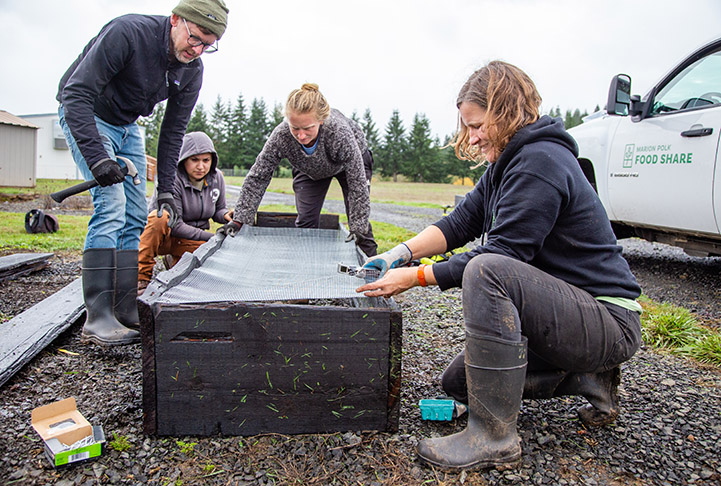Cultivating cultural knowledge

Marion Polk Food Share Farm & Gardens team members build a new set of raised-bed gardens at the Confederated Tribes of Grand Ronde.
A new set of garden beds installed in Grand Ronde by Marion Polk Food Share staff are helping young people grow their knowledge of Tribal culture, traditional First Foods, healthy eating and plant management.
The project is part of collaboration between the Food Share’s Farm and Gardens team and the Confederated Tribes of Grand Ronde’s hayu-munk skukum, an enrichment program for Native youth.
The four new beds were placed alongside others previously installed by Food Share staff that contain traditional First Foods including camas, brodiaea, yampah and allium, and are used to teach students about Tribal culture.
When the opportunity arose for the Food Share to add more beds, Jerald – an enrichment coordinator with hayu-munk skukum – was thrilled about the potential to expand the garden to include more traditional plants.
“We really want culture to be a big part of the program,” he says, “so the kids can just go outside and see that culture right there.”
Three of four new beds were planted this spring with additional native plants including a native strawberry, bare-stem biscuit root, and yerba buena; the fourth bed is being used to grow more traditional vegetables. Staff members with hayu-munk skukum are working with Jeremy, who oversees the Tribe’s native plant nursery, to tend the new beds and teach the youth about how to grow, harvest and use the plants.
“It’s good for kids to get outside, to stop and interact with nature for a little bit and get their hands dirty,” Jeremy says. “They’re learning that native plants and the roles they play in nature are important, not just for people, but for pollinators and the animals that rely on them.”
The new garden beds have expanded the capacity for growing culturally significant plants while helping hayu-munk skukum staff seamlessly integrate teachings about Tribal traditions into their curriculum.
“What we’re trying to do here is not make it like a lesson, but to make it a part of everyday life,” Jerald says. “We’re not going to say ‘we have a cultural lesson.’ We’re just going to say, ‘let’s go out and take care of the garden.’”
Learning about First Foods and plants is a key way for the youth to learn Tribal traditions, Jerald says, noting that hayu-munk skukum students are taught that no matter where they are, they can practice their culture by growing and using the plants.
“We’re taking care of the land and the plants that sustain everyone,” Jerald says. “So that’s how we look at it, is culture isn’t something to be taught, it’s just something to be lived.”
Support from friends like you make projects like this possible. Thank you!

